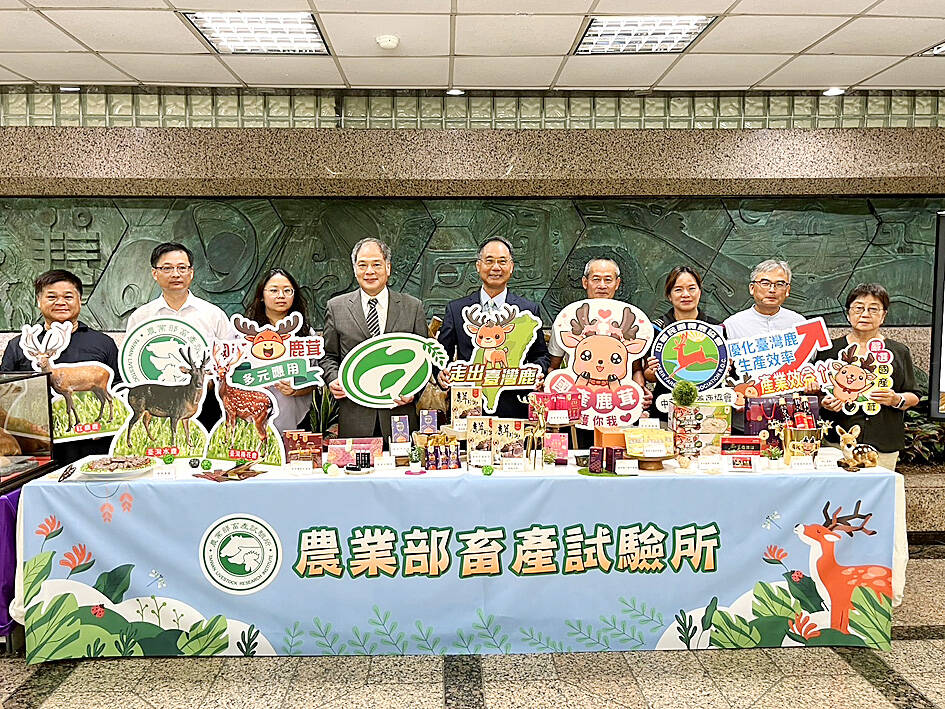Tariff-free velvet antler imports from New Zealand should pose no cause for concern to Taiwanese ranchers, the Ministry of Agriculture said on Friday after touting the past decade’s advances in deer breeding techniques.
The ministry’s Taiwan Livestock Research Institute has dedicated significant resources to boost the competitiveness of the medicinal deer antler industry after Taipei and Wellington inked the Agreement Between New Zealand and the Separate Customs Territory of Taiwan, Penghu, Kinmen and Matsu on Economic Cooperation (ANZTEC) in 2013, institute director-general Huang Jeng-fang (黃振芳) said.
The institute spearheaded numerous research programs that increased the maximum yield of velvet antlers from 300g to 500g per head, while the stud buck-to-doe ratio for breeding surged from 1:20 to 1:100, she said.

Photo: CNA
In addition, new feed formulas have reduced the cost of raising deer by 30 percent, Huang said.
These productivity and efficiency increases are matched by marketing and sales innovations that have created novel types of antler products other than typical medicinal liquors, she said.
Medical studies funded by the institute showed that deer antler extract used in wound ointments can promote healing, she said.
Government and private sector collaborations led to the creation of new products that expand the consumer market for velvet antlers, including red-date medicinal beverages for women, jelly snacks catering to children and essence of chicken infusions, Huang said.
Taiwan would learn from South Korea’s example in developing antler products that possess a local competitive advantage, she said, citing the latter’s invention of Korean ginseng and antler extracts.
Institute researcher Lin Hsin-hung (林信宏) acknowledged that the cost of raising deer in New Zealand is 50 percent lower than in Taiwan, but added that Formosan sambar antlers were more beneficial to the immune system than European red deer.
The institute plans to conduct more studies with the National Taiwan University and National Cheng Kung University on the medical properties of Taiwanese velvet antlers in anticipation that antlers produced in the nation would likely outperform their competitors, he said.
Taiwan Deer Farmers’ Association chairwoman Chang Shu-chen (張淑珍) said Taiwanese velvet antlers are of a higher quality than foreign imports and the nation’s farmers treat their animals with greater care, which yields a superior product.
The outlook for Taiwanese deer farming remains optimistic because marketing studies showed that 80 percent of the industry’s business stems from custom-ordered products from a clientele known to the producer, she said.
A full listing of antler-based items can be found on the Deer Farmers’ Association Web site at the address https://deardeer.org.tw/index.php, Chang added.

Prosecutors in New Taipei City yesterday indicted 31 individuals affiliated with the Chinese Nationalist Party (KMT) for allegedly forging thousands of signatures in recall campaigns targeting three Democratic Progressive Party (DPP) lawmakers. The indictments stem from investigations launched earlier this year after DPP lawmakers Su Chiao-hui (蘇巧慧) and Lee Kuen-cheng (李坤城) filed criminal complaints accusing campaign organizers of submitting false signatures in recall petitions against them. According to the New Taipei District Prosecutors Office, a total of 2,566 forged recall proposal forms in the initial proposer petition were found during the probe. Among those

ECHOVIRUS 11: The rate of enterovirus infections in northern Taiwan increased last week, with a four-year-old girl developing acute flaccid paralysis, the CDC said Two imported cases of chikungunya fever were reported last week, raising the total this year to 13 cases — the most for the same period in 18 years, the Centers for Disease Control (CDC) said yesterday. The two cases were a Taiwanese and a foreign national who both arrived from Indonesia, CDC Epidemic Intelligence Center Deputy Director Lee Chia-lin (李佳琳) said. The 13 cases reported this year are the most for the same period since chikungunya was added to the list of notifiable communicable diseases in October 2007, she said, adding that all the cases this year were imported, including 11 from

China might accelerate its strategic actions toward Taiwan, the South China Sea and across the first island chain, after the US officially entered a military conflict with Iran, as Beijing would perceive Washington as incapable of fighting a two-front war, a military expert said yesterday. The US’ ongoing conflict with Iran is not merely an act of retaliation or a “delaying tactic,” but a strategic military campaign aimed at dismantling Tehran’s nuclear capabilities and reshaping the regional order in the Middle East, said National Defense University distinguished adjunct lecturer Holmes Liao (廖宏祥), former McDonnell Douglas Aerospace representative in Taiwan. If

The Mainland Affairs Council (MAC) today condemned the Chinese Communist Party (CCP) after the Czech officials confirmed that Chinese agents had surveilled Vice President Hsiao Bi-khim (蕭美琴) during her visit to Prague in March last year. Czech Military Intelligence director Petr Bartovsky yesterday said that Chinese operatives had attempted to create the conditions to carry out a demonstrative incident involving Hsiao, going as far as to plan a collision with her car. Hsiao was vice president-elect at the time. The MAC said that it has requested an explanation and demanded a public apology from Beijing. The CCP has repeatedly ignored the desires